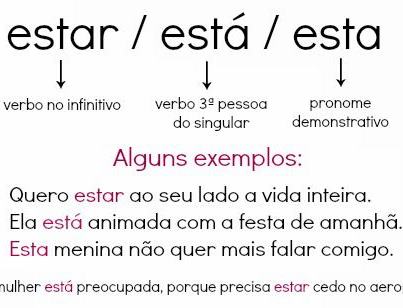Hello guy! How are you doing? After a short break on our posts we’re back to talk about VERBS IN PORTUGUESE! 😉
Doubts in the conjugation of verbs are very common, even for native speakers, but we are here to try to help you to understand how to conjugate a verb in Portuguese by learning some good tips that may help you to understand the logic behind Portuguese verbs.
The first thing you should know is that all the verbs in Portuguese end in -AR, -ER or – IR, for exemple: caminhAR, escrevER and partIR. So we say that there are verbs divided into 3 conjugations: 1°: AR, 2°: ER and 3°: IR. This conjugations are also the INFINITIVE of the verbs. For example, “cantar”(to sing), “sentar” (to sit down) are verbs in infinitive and they are from first conjugation because they end in -AR.
The most important thing when we are learning how to conjugate verbs in Portuguese is to know that for each one of these conjugations (-AR, -ER and -IR) there is a verb ending. When the verbs are REGULARES it is easier because the ends will be the same, changing only according to the personal pronoun and the conjugations.
So today let’s start with the Simple Present or PRESENTE SIMPLES – INDICATIVO. Look at the example below:
CAMINHAR (To walk)
Eu caminho
Você caminha
Ele/Ela caminha
Nós caminhamos
Vocês caminham
Eles/ Elas caminham
Now you can see that all the REGULAR VERBS ending in AR will have the same end. Let’s see another verb:
FALAR (to speak)
Eu falo
Você fala
Ele/ Ela fala
Nós falamos
Vocês falam
Eles/ Elas falam
As you can see they will always end in the same way. Now check this verb from the 2nd conjugation (-ER):
COMER (to eat)
Eu como
Você come
Ele/ Ela come
Nós comemos
Vocês comem
Eles/ Elas comem
All the regular verbs from the 2nd conjugation will end in -o, -e, -e, -emos, -em, -em.
Now to finish, let’s see how to conjugate verbs from the 3rd conjugation (-IR)
PUNIR (to punish)
Eu puno
Você pune
Ele/ Ela pune
Nós punimos
Vocês punem
Eles/ Elas punem
And this is all that you need to know to start to use the regular verbs correctly 😉
I hope this text has helped you to understand better the regular verbs. Leave you comments or your doubts, I will be glad to help you further. If you think it could be helpful to a friend feel free to SHARE IT.
See you soon! Até logo!
Tchau!

